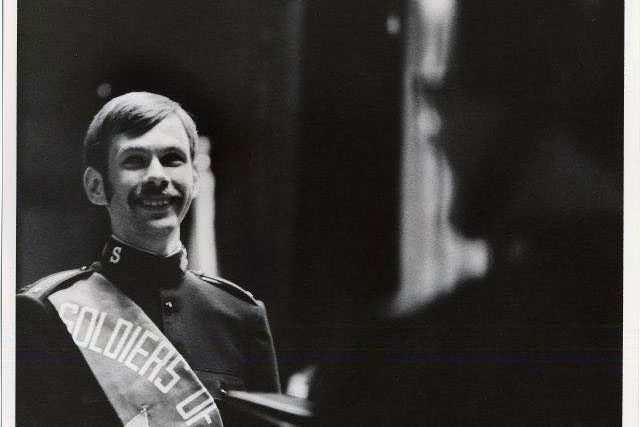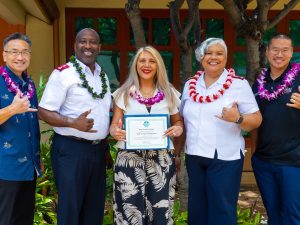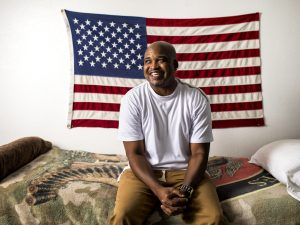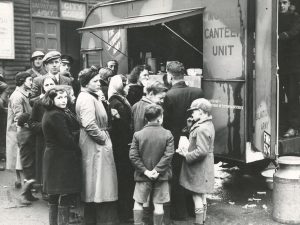After 45 years encompassing some 15 appointments as a Salvation Army officer, Commissioner David Hudson retires this month as The Salvation Army’s National Commander.
Those who know him might say his career-long service is marked by one word: Respect. And that’s not by chance.
Hear what he had to say in reflecting on what it takes to be faithful, why getting to know people is key and what he has to say to The Salvation Army on his final day at the helm in this interview with Caring editor in chief Christin Thieme.
Christin Thieme: What have you learned in being part of The Salvation Army?
David Hudson: I think that there really is goodness in the world. I think we tend to focus sometimes on the other, but I think there really is goodness in the world. Unfortunately there are injustices, and I think too often we become accustomed to them.
I think of the parable of Lazarus, the rich man. There was the poor beggar outside of his palace, starving, and he had sores and everything else. Later that night, Jesus said that his soul was required of him. If you look at the judgment that God had on Lazarus, it wasn’t anything he did or didn’t do. It’s just he didn’t even notice. He just didn’t even see the injustice that was right there in front of him.
So, I think that there is goodness, but I think there are injustices that we just don’t pay attention to, and we become self-absorbed. I don’t mean that in a negative way. I think that we just all kind of get used to living our life, and we don’t think or see anything beyond that, sometimes. I think God calls us to see beyond ourselves.
I’ve also learned that coming together is more productive than not coming together. I think if there really is goodness in the world, and if we acknowledge that there are injustices, and if we really come together, I think we can be very productive in working toward alleviating a lot of those injustices.
After 45 years of officership, one could say that you have been faithful to your calling. What does it take to be faithful?
I think that it would be really easy to give spiritualized answers, and I’m trying not to do that. Certainly, I could say, “God has been forever faithful to me, and he calls us to be faithful.” All of that is true. But, I think you have to be determined to be faithful. Years ago, so many of our friends that are officers were walking away [from The Salvation Army]. I’m not casting judgment on them, at all. They all had valid reasons for doing so.
As we talked to them, they looked really happy, and we weren’t really happy, right then. Things weren’t going quite the way we thought that they should be going. We had just moved from Idaho to Southern California, and probably had a little bit of culture shock and everything else going on in that. I actually put a job application in someplace. To my surprise, they called me and wanted me to come in for an interview. It scared me to death.
I said I’d get back to them, and I talked to Sharron. At that point, we determined that we would never walk away when things were difficult because that means that we really did quit. Conversely, if we were to ever walk away from whatever, as officers, or the Army, it had to be when times were going well so that we could put it in the context of time. I think that’s part of determination.
I think that one thing that all the years have taught me is we tend to think our current reality will be forever. Like right now, people are thinking that this [pandemic] is going to go on forever. It won’t. It’s going to change. Our current reality is seldom our destiny. When we focus on the here and now, I think we sometimes tend to make less-than-best decisions versus in the context of time.
Part of the covenant a Salvation Army officer signs before being ordained states, “I will live to win souls. I will not allow anything to turn me aside from seeking their salvation.” What’s been your approach to seeking someone’s salvation?
I think love—truly loving and accepting people as they are—and treating all people with respect and kindness, letting them know that God has a best for them. I have no idea what God’s best for them is, but he does.
I love the mission of The Salvation Army, but I think that we tend to separate it, like part A and part B, or we do one then the other. We preach the gospel of Jesus Christ and we show his love by meeting human need without discrimination. Or, we meet people’s need without discrimination in order to qualify them and give us credibility to preach to them. I don’t believe that.
I think if we truly talk about, “What is the gospel of Jesus Christ?” the gospel of Jesus Christ certainly is about reconciliation to God. It is about reconciliation to God and man, man to God, and brother to brother, brother to sister, sister to sister. It’s about restoration. It’s about restoring us to be what God desires to be the best in us. It’s about unmerited favor with God, his grace that he gives upon us. Then it’s not about me, it’s about him. And so preaching the gospel and meeting human needs without discrimination is one thing. You could almost take out the “and.” The mission is continual.
Salvation is restoration to a right relationship with God through the work of Jesus Christ. I think that the way I try to approach seeking somebody’s salvation is their entire salvation, and for them to be right with God, to live the life that he would have them live. But in order to do it? You do it through valuing them, respecting them, caring for them and listening to them. All of these things are so vitally important.
I’ve never seen a person changed by a program, ever. I’ve seen programs lead to relationships, and I’ve seen thousands of people’s lives changed by relationship.
Three times Jesus asked Peter, “Do you love me?” We could get into the Greek and how he changed the question the third time, but every one of the responses were very much the same. “Feed my sheep. If you love me, take care of my people. Love my people. Take care of their needs.” I think that that’s how I view my call to help seek the salvation of others.
When you think about it, why does somebody follow God? Well, they see God in other people, more times than not.
You’ve said respect is your no. 1 core value. Why?
I don’t think that we choose our core values. I think that they choose us.
I was on a real journey. It wasn’t that I thought, “Okay, what do I value?” It’s a journey into self-discovery and I learned about my value of respect. One of the main ways it taught me is it really bothers me when I see people disrespected. Anybody that I see disrespected, it bothers me into the core of my being because I truly believe everyone deserves respect, even those, and maybe especially those, who I disagree with or they disagree with me because everybody is due my respect.
One person tried to correct me and said, “Well, don’t you mean mutual respect?” No, because mutual respect is conditional. That means that if somebody doesn’t show me respect, it gives me an out. I don’t have to show them respect, and I don’t think I have an out on this. If I don’t show somebody respect, then I’m failing them.
In the office, you would often wander the halls visiting people or make calls to thank someone for their work. Why did you spend time doing those things?
Well, first of all, I love it. I love being around people. People think I’m an extrovert. I really don’t think I am. I think I’m a social introvert. I just love being around people. But I also know the value of relationships. The thing is, I love being around people, I love relationships and I believe that people should work from points of strength. We always try to shore up our weaknesses. We say, “I wish I could change this, this, this, this, this about me,” and we have about 50 things that we want to change about ourselves. There are so many things that we very seldom get around to doing any of them.
But God has gifted each of us with gifts. The Bible talks very clearly about giftedness of believers, and we’re all gifted in different ways. I think that we need to use the gifts that God gives us in order to fulfill his mission. So, I just want to be around people. I also believe in the power of belief. I know that firsthand because there have been many people that have believed in me when I didn’t believe in myself, and they gave me courage. I always think of encouragement as breathing in courage, rather discourage is to take out courage.
And when you really believe in somebody, you sit down with them and you talk to them. You encourage them to achieve things beyond what they might otherwise achieve. Studies have shown that people will do their utmost to live up to the expectation of other people who care about them and truly believe in them. There has been study upon study on that. The whole movie My Fair Lady is based on that. It’s called a Pygmalion Effect. If you truly believe in somebody, they will strive to reach that level of belief. So, when I was walking the halls and getting to know people, it was because you have to get to know people in order to know what to believe in them. So, you just spend time, and you invest and let them know that they’re important.
It’s interesting. If we were to make a list or we did a workshop and started by asking, “What are the greatest leadership traits?” So many times, objective things are listed. “They’re a great communicator, they’re a visionary, they’re an incredible manager of resources, they’re brilliant at finances.”
Now, in our own life, who has had the most impact on us? We start thinking about people. Why? It’s very seldom the objective things. It’s more subjective. “They spent time with me. They cared about me. I knew that I mattered when I was with them.” That inspires us. So, I just really believe in the power of relationship, the power of belief. You can’t do those things if you don’t know people, and getting to know people takes time. It takes energy, it takes priority and it takes commitment.
Beyond being there for individuals, you’ve also given your encouragement to groups. As National Commander, you’ve written various columns and spoken out in different ways. A notable one is when you responded to accusations that the Army discriminates against the LGBTQ community. The organization doesn’t always respond, but you took a stand. Why?
I’ve always wondered the same thing. I remember, going way, way back, and when I thought people were misrepresenting us, I would say, “Well, why aren’t we saying something? We need to speak up.” Then all of a sudden, I found myself in the role, and, “Well, yeah, I guess I better.” That’s maybe a superficial answer. But here is the real big one: It’s a threat to mission.
I think people think that the misunderstanding with the LGBTQ community is a financial issue. People keep saying, “Well, the Army is going to do something about this because they’re losing donations.” That’s really a secondary thing. This is the primary thing: it’s a threat to mission because if there is somebody out there who really believes that we will not accept them, they won’t come to us for the very services that we provide better than anybody else.
I’ve heard these stories over, and over, and over again by the people that did take the chance. They, later on, said, “I’m so glad I did.” I’ve met tons of people. I would go into our Harbor Lights, or our shelters, or our ARCs, or whatever the case may be. You name the program, and I would meet somebody. I would sit down and I’d talk with them and I would hear the stories. A guy would say, “I’m gay, and I was really nervous about coming here because I really didn’t think the Army would accept me.” Then he’d said, “But I’m so glad I did because people, they loved me and they cared about me.”
How many don’t come to us because of that same fear? They continue to live in their addiction. They continue to live on the streets because they’re afraid. I just think that we need to start communicating to people, at large, nationally and territorially, and to LGBTQ groups that our programs are open to people, and nobody is going to be a second-class citizen. Everybody is going to be accepted, everybody is going to be cared for, and everybody is going to be respected. If not, let me know, and I’ll follow up.
When people say, “Well, The Salvation Army discriminates,” I’ll say, “Okay, give me the for instance. I mean, tell me where.” It’s usually responded with, “That’s just what I’ve heard, and I just know it to be true.” “Well, I can’t act on that. Tell me where and when, I’ll follow up, and I’ll get back to you.” You just don’t see it.
God calls us to love and accept everybody. Acceptance and approval are two different things. I know that I’ve been accepted many times, and there’s been incredible power of change that comes. And I know that that’s what God expects of me, and it’s God’s job to change somebody, not mine. I believe fully that God is able to his job.
I think people are afraid of what we don’t know. I met this young guy once. He said he was gay. He said he grew up in a Christian home, and when his family found out he was gay, they kicked him out.
That really bothered me. I’m thinking, “You grew up in a Christian home, and when your parents found out at the age of 16, and they threw you out?” The whole way back to the hotel I kept thinking, “You grew up in a Christian home, and your parents found out that you were gay, and they threw you out?” I couldn’t wrap my head around that because I immediately think of my two daughters, and I don’t think you could name anything where I would ever do that. I would not.
No wonder people have these attitudes about Christianity. Even if the parents disagree with the lifestyle, you still love your child, and you still need to accept your child. So it’s that same thing. It just doesn’t reconcile with me. You can always accuse me of erring on the side of grace.
So how do you encourage people to live out our values and beliefs despite any fear we might be feeling?
It’s interesting, I think when you get to know people, really get to know them, fear starts going away pretty quick. I heard a speaker last year speak on racial equality, and it was broader than just equality. It was about relationships between the different races.
He said, “You know, there’s a lot of white people in the room.” And, you know, yeah, he was right. There were a lot of white people. He said, “How many of you have friends that don’t look like you? The way to break down barriers is to get to know people that aren’t like you.” Well, that speaks volumes beyond any one thing, because once I get to know a person, then all of a sudden, it becomes a person, not an issue.
But before that, it’s always an issue. It’s always easy for me to take a real hard line. Be black and white, yes and no, right and wrong. But when I start seeing a person, then all of a sudden, there’s that dialogue. Out of the dialogue comes common ground, and out of common ground builds relationships. Out of relationships, then all of a sudden, potential for change in both people takes place.
Oftentimes, we want to have relationships in order for people to be changed to become more like us. Well, okay, that’s good, but maybe we should become more like them, sometimes.
It’s interesting to me. Jesus was defined as a friend of sinners, but he never said that. He didn’t say, “I’m a friend of sinners.” It was just that he would associate with people who the religious organization identified as sinners. Matter of fact, if you go to the ones that really annoyed him, it was the self-righteous. That’s the only group that really annoyed him. So, I just think if we want to overcome fear, the best way to do it is to actually confront the thing that we’re fearful of. If we’re fearful of any people and any group, the best way to do it is to go and identify, spend some time, get to know people, and talk. All of a sudden, you’re going to see a person on the other side.
As a people person, and as National Commander, is there any particular person who stands out to you?
You know, I’m not sure if there’s been any one. We talk about the front lines all the time. The people on the frontline that are tirelessly working to fulfill the mission, those people inspire me. I could think of so many of them.
One woman, Amy, met The Salvation Army while she was in prison. She went into a group hall or a big room where several of the inmates were, and she saw a sign across the room that had some color. It had some red in it. She said in prison everything is black and white, so you’re automatically attracted to anything in color.
It looked like it said Salvation Amy. She goes, “Oh, my goodness, what is this? I’m going to go over and see what this is.” Well, she got closer, and she said, “Oh, that’s The Salvation Army.” It was talking about a pre- and post-release program that The Salvation Army does in that area. She got involved with the program while she was in, and then she got involved after she was released.
Well, today, she is working for The Salvation Army in the post-release program. She tells her story, and then she says, at the end, “I thought that the sign said Salvation Amy. And you know what? I was right because it was for me.” I’ve never forgotten her. She inspires me because she’s one of the people we served, but she’s out there now doing something to help others.
Another one, Nancy, runs a massive program in Chicago. A number of years ago, she heard that there was a gang disturbance in her community. Now, most people hear there’s a gang disturbance, they will run the opposite way. She ran toward it. She went right into the disturbance and told the people that we’re going to pray. She started praying for the people, right then, that were in the midst of all of the disturbance.
She ran toward the group and prayed for these people. I had the privilege of going out on the streets of Chicago and distributing Narcan with her to family members of people that were in danger of overdosing. She inspires me.
So when I think about what is best about The Salvation Army, I think of people like Amy, and I think of people like Nancy. They are the best of what we have.
You wrote once that setting yourself apart or consecrating yourself, as we hear a lot in the Bible, is heart purification work. How have you sought to do that in your own life?
Again, I’m going to work hard not to over-spiritualize anything. But I need to remind myself whom I belong to, and the easy answer is it is God. I belong to God, and it’s him at work within me. And that’s true. That’s 100% true, but also, I belong to others.
I once chaired an officer review board, and officer review boards don’t tend to be pleasant. You tend to deal with things that aren’t pleasant to deal with. Officers, for one reason or another, have gotten themselves involved in things that they shouldn’t have, or done something that they shouldn’t have.
I remember when that meeting was over, I don’t know where this thought came from, but, “What would the people that I’ve had the privilege of ministering, and caring for, and being with through that time, what impact would it have on them if my name was on that agenda?” If I was honest, it would devastate them, and I can’t do that. You see, I owe it to them to be the best I can absolutely be because my life is not my own. Scripture talks about that, you’ve been bought with a price.
We belong to Christ, and that is absolutely true. But we also belong to one another, and that requires that focus on heart purification, on being the best I can be, and not just giving the appearance that I’m being the best I can be. Because, again, the people that I have been privileged enough to work with, they deserve more than a counterfeit. If I weren’t who I was portraying myself to be, I would be a counterfeit. I’d be a hypocrite, for one, especially toward God. But I would be a counterfeit to them.
Right now, what spiritual encouragement would you offer to The Salvation Army?
I’d say we need to be the movement that God called us and created us to be. I think, too often, we try to be like other churches and other organizations. God doesn’t need another Baptist Church. He’s got one. He doesn’t need another Catholic Charity. He’s got one. Or Volunteers of America or Red Cross, he’s got them. I mean, I don’t know if he’s got them, but the world has them. But our mission is so powerful when it’s done in its entirety, and so I would encourage the Army to be the movement that God called us to be.
It’s not about the methods. It’s about the motivation. Too often we get caught up in the methods of, “This is what we do.” It’s not that, it’s the motivation. It’s the motivation that motivated William Booth to send that one-word telegram: “Others.” That is our motivation. All of the slogans and everything else aside, it’s about focusing on other people.
The one thing this year has done is bring out the best in The Salvation Army. All of a sudden, we don’t worry about how, “We need to be like them, and like them, and like them.” We just run to people. It’s like Nancy running to the problem. It’s the motivation to fulfill the mission.
So I would say: be who we were created to be.
And if you could send a note to every Salvationist and friend of The Salvation Army on your last day as National Commander, what would it say?
Be yourself. God made you to be you, and be the best you that you can be. Invest in your work, and invest in others.
Do Good:
- Read more about Commissioners David and Sharron Hudson and their retirement.
- See how you can get involved in the Fight for Good at westernusa.salvationarmy.org.
- Did you know The Salvation Army served more than 23 million Americans last year fighting hunger, homelessness, substance abuse and more—all in a fight for good? Where can you help? Take our quiz to find your cause and learn how you can join in today.












